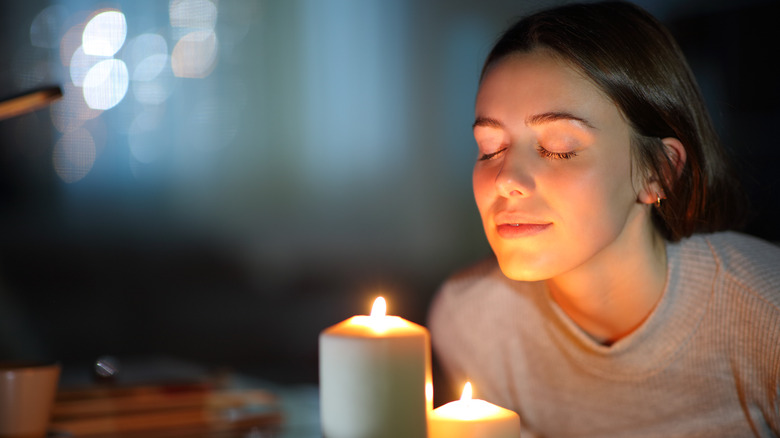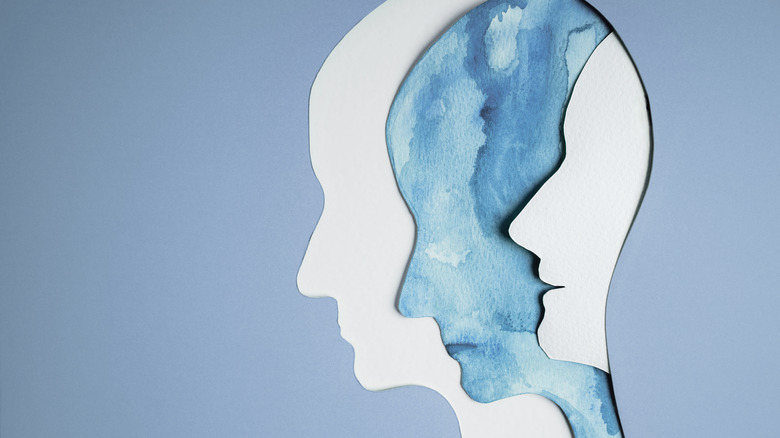'Darkness Retreats' Sound Scary, But Could They Be Transformative For Mental Health?
In the world of social media, it is easy to get overwhelmed by the noise of it all. Unplugging, the term used to describe withdrawing from the internet to decompress, can be a useful wellness trend, like a social media detox for your mental health. However, an ancient practice is rising in popularity that takes this form of tranquility to a new level — but can this "dark" yet rejuvenating practice solve everyday life problems?
"Darkness retreats" have recently been thrust into the spotlight thanks to Green Bay Packers star Aaron Rodgers. The 39-year-old is contemplating retirement after 18 seasons in the NFL. During his recent appearance on "The Pat McAfee Show," the profound quarterback revealed that he's headed to one of these tranquil experiences to help better make his decision regarding ending his football career. Though it may sound odd to most, many believe this unorthodox method has been proven to help improve insightfulness, tapping into a mental space that is not frequently experienced under normal circumstances.
Time in the dark can unearth a new you
"Darkness retreats," also known as "darkness therapy," is just as literal as it sounds. Participants are placed in complete darkness for an extended period of time. Food and water are provided, but since the environment promotes detoxing, one can assume that even meals are light. Though a new concept to most, darkness retreats have been popular for centuries within religions such as Tibetan Buddhism and Bon, a branch of traditional Buddhism. When used to strengthen one's spirituality, the belief is that participants will face ancient deities. In the modernized version of dark retreats, experts say complete darkness promotes lucid dreams and hallucinations. Dr. Eric A. Zillmer, a licensed clinical psychologist at Drexel University in Philadelphia and director of the Global Sport Leadership Solutions Lab, describes the experience as "dreamlike sleep but awake." In other words, it's quite possible that someone who claims to see spirits or any kind of visions is speaking the truth.
Hayley Saraswati, the founder of the Forest Path, spent her dark retreat inside The Hermitage in San Pablo la Laguna, Guatemala. Saraswati described seeing flashing lights in the dark for several hours on the third day. This resulted from sensory withdrawal, which occurs in the absence of light and outside distractions. In the end, Saraswati says she discovered her "inner light" through the process.
Visions are pretty cool but do dark retreats actually help in the long run?
The notion of tapping into a different subconscious sounds peaceful to an extent, but after the retreat is over, it's hard to pinpoint its long-term benefits. Whether or not this relaxed state lingers once in the regular world remains to be seen. What is known is the lasting adverse effects that complete seclusion can have on a person's mental state.
A study conducted in the 1960s by cave researchers, Josie Laures and Antoine Senni, found that after spending 88 and 126 days in the caves, respectively, both had lost a tremendous sense of time. Additionally, Senni would reportedly sleep for spans of up to 30 hours at a time, waking up believing that he'd only napped for a few minutes. In a study that was documented in the 2008 BBC program "Total Isolation," individuals were voluntarily placed in complete darkness to spark sensory deprivation. Many were confirmed to hallucinate. Adam Bloom, who spoke after partaking in the research, reported going back and forth between singing and crying before falling into a deep paranoia.
If nothing else, dark retreats force subjects to face their fears in a quiet area. Like Aaron Rodgers, if you choose to embark on this journey, keep it brief.


